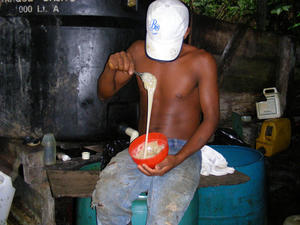President Obama’s election in 2008 raised hopes that Washington would finally put an end to the decades-long “war on drugs.” After all, Obama had admitted using drugs himself and actually enjoying it—going well beyond former President Bill Clinton’s ridicule-attracting assertion that he had smoked pot but “did not inhale.” In contrast to this year’s electoral campaigns in which drug policy was never even mentioned, in 2008, candidate Obama promised that if elected, he would seek to change the disparity in sentencing between crack and powder cocaine, reverse the federal government’s interventionist stance on state medical marijuana laws, and end the ban on federal funding for needle exchange. While little was said about Latin America, enthusiasm ran high that the Obama administration would recognize that the drug war has failed demonstrably in meeting the government’s stated objectives, while causing tremendous collateral damage across the region.

Upon taking office, the Obama administration immediately changed the bellicose terminology that has long characterized U.S. drug control policy, ceasing to refer to it as a “drug war.” Obama’s top drug official, Gil Kerlikowske, a former police chief who became director of the Office of National Drug Control Policy (ONDCP), announced that he would not use such language, since you cannot wage war on your own people. U.S. Secretary of State Hillary Clinton publicly admitted that drug policies had failed and that as the major consumer of illicit drugs, the United States must take more responsibility in confronting the demand problem. While she was stating the obvious, it marked a first for a high-level U.S. official. And the administration did implement some changes to domestic drug policies.
Yet as far as Latin America is concerned, the change in rhetoric did not transform the policies and programs implemented on the ground. For all practical purposes, the U.S. drug war is still going strong and is even being dangerously ratcheted up in Central America. Yet while Washington’s approach to drugs remains impervious to change, grassroots initiatives are threatening the status quo. On November 6, voters in two states, Washington and Colorado, approved referendums to create legal, regulated markets for cannabis. Thus, part of the United States is now at odds with the very international drug control regime that Washington created and so staunchly defends. The message will not be lost on Latin American countries already questioning the prevailing drug policy paradigm and calling for debate on more effective alternatives.
Now elected to a second term, Obama has the opportunity to join the presidents of countries like Guatemala, Colombia, and Uruguay who are calling for reform. To do so would take firm political commitment and a willingness to stand up to accusations that would no doubt be hurled by his domestic political opponents of being “pro-drugs.” Unfortunately, the president has given little indication that this is a battle he is going to stake political capital on in his second term.
The Obama administration did implement modest but important changes to domestic drug policy, some of which might have been reversed had Mitt Romney won the election. The administration followed through with two of his three promises described above: At the end of 2009, Obama signed a law ending the prohibition on most federal funding for sterile needle-exchange programs, which have proved effecting in stopping the spread of HIV and other infections among injecting drug users; unfortunately, the U.S. Congress later reinstated the ban. He also encouraged legislation to reduce significantly the disparity in sentencing between crack and powder cocaine, which was passed in August 2010. In general, the Obama administration has shown greater interest than its predecessors in reducing incarceration rates.
Perhaps the most noticeable advance, however, is the greater priority placed on reducing demand for illicit drugs, with modest increases in funding toward that end. The Obama administration’s annual drug-control strategy now emphasizes community-based prevention programs and integrating drug treatment into mainstream health care in order to expand access to such services. Of particular importance, drug treatment will be covered by health insurance under “Obamacare.” A reversal on that front—as would likely have occurred if Romney had won the election—would have been a major setback to efforts to ensure that problematic drug users had access to effective treatment programs.
In regard to U.S. drug policy in Latin America, the administration has proved more diplomatic than its predecessors. Whereas in the past, the White House has been quick to criticize drug legislation or other actions not to its liking, the Obama administration has for the most part remained silent. Apart from diplomacy, however, U.S. drug policy remains on autopilot. When Obama took office, expectations ran high among drug-policy activists that at the least the new administration would discontinue spraying dangerous herbicides over the Colombian rain forest. Not only has aerial spraying continued, but forced eradication of coca and poppy, used to manufacture cocaine and heroin, remains at the center of U.S. drug policy, despite overwhelming evidence that it fails to reduce cultivation, generates violence and social conflict, and pushes some of the world’s poorest farmers deeper into poverty.

Plan Colombia, touted by the U.S. government as a major success story, has wound down, but in its wake came the Merida Initiative in Mexico, which—as with the Andean Initiative launched in 1989—was front-loaded with U.S. military and police assistance. U.S. anti-drug aid to Central America’s security forces has steadily increased through the Central American Regional Security Initiative (CARSI). A cornerstone of U.S. drug policy toward the isthmus is the DEA’s Foreign-Deployed Advisory Support Team, or FAST. Initially operating in Afghanistan to disrupt the poppy trade, FAST teams are now deployed in Honduras, along with U.S. Special Forces, whose Green Berets have been training Honduran Special Operations forces. The dangers of further militarization in a region with a tragic history of internal conflict, violence, and extremely weak institutions was made painfully clear on May 11, 2012, when Honduran forces accompanied by DEA agents on an anti-drug mission near the town of Paptalaya opened helicopter gunfire on a boat that police initially claimed was carrying illicit drugs, killing four people—two women (one of them pregnant), a 14-year-old boy, and a 21-year-old man. All had legitimate reasons for being on the river early that morning. Investigations into the killing are moving at a snail’s pace.
Three key factors help explain why continuity has prevailed over change in U.S. drug-control policies, and each presents a possible impediment to a change in course during Obama’s second term. First, for the most part drug “warriors” on Capitol Hill continue to have the upper hand on drug-policy issues debated in the U.S. Congress. As the elections reaffirmed the status quo in Washington, there is no reason to expect that to change. Second, the drug-war bureaucracy remains bloated, firmly entrenched, and extremely resistant to change. Apart from a few notable exceptions at ONDCP, the same officials continue to be the driving force behind U.S. drug policy, in some cases for decades. And over the years, the drug-policy bureaucracy has obtained a great deal of autonomy from the broader official policy-making community. Finally, because of these dynamics, high-level and committed leadership from the President is needed to begin to change the status quo. Yet the Obama administration is engaged in major debates on a range of salient issues that continue into its second term. Based on his comments following his reelection, the president’s political capital will more likely be spent on issues such as climate change and immigration reform.
Given the continuity in U.S. drug policy, a Romney victory would probably not have led to a significant change in strategy or programs implemented on the ground in Latin America. However, it would likely have led to a change in rhetoric and tone, potentially contributing to the growing distance between key countries in the region and the United States on a range of important policy issues. As noted, the Obama administration has sought to be more diplomatic and less interventionist in its approach to the region and to drug policy, refraining from public criticism of reforms that contradict U.S. policy. Between hardliners in the U.S. Congress and their Republican counterparts in a Romney White House, one could imagine, in particular, escalating tensions with Bolivia and Venezuela. In both cases, the Obama administration routinely “determines” that they have failed to comply with international drug trafficking objectives (an annual process mandated by the U.S. Congress), but has done so with little fanfare. Perhaps of greatest significance, it is likely that a Romney White House would have vociferously opposed the increasing calls for drug-policy reform emanating from the region, potentially creating a tense standoff between Washington and those countries advocating such reform.
The Obama administration faces an immediate drug-policy test—and political conundrum—as it defines its response to the cannabis legalization initiatives approved in Washington and Colorado, which pit state law against federal law. (The federal Controlled Substances Act prohibits the production, sale, and possession of marijuana.) In Washington State, 55.4% voted to “legalize the production, distribution and possession of marijuana, and establish regulations.” A similar initiative passed in Colorado with 54.8% of the vote. In both cases, possession for personal use will become legal and, ultimately, cannabis could be sold at state-licensed stores. Colorado will also allow individuals to cultivate six plants. Washington’s 66-page regulatory proposal was carefully written to stand up to federal pressure.
The Obama administration will be weighing many factors as it decides how to respond to the initiatives in Washington and Colorado. A range of policy tools are at its disposal, including stepping up DEA enforcement activities, taking action in the courts, or threatening to seize marijuana tax revenues. It will also likely be looking at the impact of its actions on the regional drug-policy debate and reform efforts.
As noted, Obama initially promised to respect state laws on medical marijuana. However, the DEA publicly expressed opposition to that position and over time has significantly increased its raids of medical marijuana facilities, apparently with no objections from the White House. In 2010 when California voted on Proposition 19, which would have legalized marijuana, Attorney General Eric Holder spoke out forcefully against it. In 2012, however, the Justice Department remained silent before the voting in Washington and Colorado. (Some speculate that the silence prevailed because Colorado was a battleground state and Obama needed the youth vote.) Since the elections, officials have made only broad statements, indicating that they are reviewing the ballot initiatives and that drug-enforcement policy has not changed. Such prudence is warranted given the broad popular support received in each state.
If Washington and Colorado are able to more fully implement their legislative initiatives, they would be the only places in the world (with the possible exception of Uruguay) where marijuana could be cultivated, sold, and consumed legally—a fact that is already making waves across Latin America. (Even in Holland production remains illegal, though individuals can legally buy small amounts of marijuana in coffeeshops.) In public comments immediately following the U.S. elections, Luis Videgaray, who leads incoming Mexican president Enrique Peña Nieto’s transition team, called the vote a game changer, stating that “obviously we can’t handle a product that is illegal in Mexico, trying to stop its transfer to the United States, when in . . . at least part of the United States it has a different status.” In other words, countries already weary of waging the U.S. “war on drugs” are even more likely to resist U.S. pressure to comply with its drug policies.
All this comes at a time when Washington’s ability to influence drug policy is rapidly waning. Latin America’s growing independence from the United States—evident in the creation of bodies such as UNASUR, CELAC, and ALBA and in Brazil’s emergence as a regional powerhouse—has also been manifest in the emergence of a regional drug-policy debate. Various factors have fueled this debate. Decades after following Washington’s repressive drug policies, most Latin American countries face even worse drug-related problems. Drug use has spread across the hemisphere, jails are overflowing with low-level drug offenders, and organized crime has skyrocketed with devastating effects marked by of corruption and violence. Some Latin American officials, such as Guatemalan president Otto Pérez Molina, are openly expressing frustration that their countries are paying a high price for failed policies, while in Washington debate on the issue has stagnated and the United States refuses to stem the flow of weapons over its borders or seriously tackle reducing demand.

For the first time, sitting presidents are calling for a discussion of drug-policy alternatives with all options on the table, including legalization. At the April 2012 Cartagena OAS summit, the presidents mandated a study to examine present policies and explore alternatives. Most recently, the governments of Mexico, Colombia, and Guatemala formally requested that the UN begin preparing for an international conference to review the current international drug control system, again insisting that all options be reviewed. For their part, U.S. officials have made clear U.S. opposition to any debate that moves beyond the confines of the existing international drug control conventions.
The cannabis legalization initiatives in Washington and Colorado will no doubt give further impetus to the debate in Latin America, as well as the reforms that are already under way. Bolivia has temporarily withdrawn from the 1961 Single Convention on Narcotic Drugs in order to re-adhere with a reservation allowing for the use of coca in its natural state. (The convention erroneously classifies the coca leaf as a dangerous drug, along with cocaine and heroin.) Countries as diverse as Argentina and Ecuador are debating new drug laws. A movement has emerged in Argentina, Brazil, and Uruguay to allow for the cultivation of marijuana for personal use.
Most significantly, the Uruguayan government has proposed creating legal, state-controlled markets for cannabis. At the time of this writing, the government is putting the finishing touches on a draft law that could be voted on in the House of Representatives by the end of November, and then by the Senate next year. The proposed legislation also includes allowing cultivation for personal consumption. The legalization initiatives in Washington and Colorado will no doubt boost the Uruguayan government’s arguments for the policy reform, and has harmed the U.S. government’s credibility in critiquing Uruguay’s actions. Moreover, these states’ initiatives mean that Uruguay may not be the only country in defiance of the international drug control conventions on the marijuana issue.
At the very least, one would hope that in his second term, Obama would show greater tolerance for the debate on drug-policy alternatives that has blossomed across Latin America. More significant, of course, would be the president’s active participation in that debate, now that he has another four-year mandate.
Coletta A. Youngers is a Senior Fellow at the Washington Office on Latin America (WOLA), a Representative of the International Drug Policy Consortium (IDPC), and a independent consultant.
Read the rest of NACLA's Winter 2012 issue: "Elections 2012: What Now?"
Read more from NACLA about the war on drugs.

